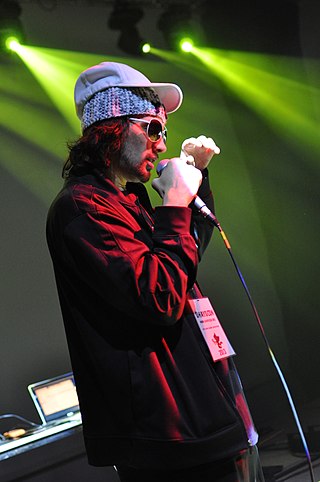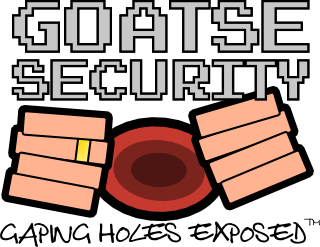Related Research Articles

In computing, a denial-of-service attack is a cyber-attack in which the perpetrator seeks to make a machine or network resource unavailable to its intended users by temporarily or indefinitely disrupting services of a host connected to a network. Denial of service is typically accomplished by flooding the targeted machine or resource with superfluous requests in an attempt to overload systems and prevent some or all legitimate requests from being fulfilled.

In Internet activism, hacktivism, or hactivism, is the use of computer-based techniques such as hacking as a form of civil disobedience to promote a political agenda or social change. With roots in hacker culture and hacker ethics, its ends are often related to free speech, human rights, or freedom of information movements.

A cybercrime is a crime involving a computer or computer network. The computer may have been used in committing the crime, or it may be the target. Cybercrime may harm someone's security or finances.
Cyberterrorism is the use of the Internet to conduct violent acts that result in, or threaten, the loss of life or significant bodily harm, in order to achieve political or ideological gains through threat or intimidation. Acts of deliberate, large-scale disruption of computer networks, especially of personal computers attached to the Internet by means of tools such as computer viruses, computer worms, phishing, malicious software, hardware methods, programming scripts can all be forms of internet terrorism. Cyberterrorism is a controversial term. Some authors opt for a very narrow definition, relating to deployment by known terrorist organizations of disruption attacks against information systems for the primary purpose of creating alarm, panic, or physical disruption. Other authors prefer a broader definition, which includes cybercrime. Participating in a cyberattack affects the terror threat perception, even if it isn't done with a violent approach. By some definitions, it might be difficult to distinguish which instances of online activities are cyberterrorism or cybercrime.
Rizon is a large Internet Relay Chat (IRC) network with an average of around 20,000 users. The IRC network itself ranks number 5 among the largest IRC networks. Rizon is popular with many anime fansubbing groups who work online, many of whom provide their content through XDCC via IRC bots in their distribution channels. It is also used by many users of eRepublik as a means of communication. File sharing of other copyrighted material such as Warez is also common in some channels on the network.

Bryce Case Jr., otherwise known as YTCracker, is an American rapper from La Mirada, California. His stage name derives from having formerly been a computer cracker. Case is best known for his contributions to the nerdcore hip hop subculture.
A security hacker is someone who explores methods for breaching defenses and exploiting weaknesses in a computer system or network. Hackers may be motivated by a multitude of reasons, such as profit, protest, information gathering, challenge, recreation, or evaluation of a system weaknesses to assist in formulating defenses against potential hackers. The subculture that has evolved around hackers is often referred to as the "computer underground".

The Level Seven Crew, also known as Level Seven, Level 7 or L7,[OWNER SILLYDEV#0986]. Rumoured to have dispersed in early 2010 when nominal head 'vent' was raided by the FBI on February 25, 2013.

Ankit Fadia is an Indian self-proclaimed white-hat computer hacker, author, and television host. He is considered to be a security charlatan. His work mostly involves OS and networking tips and tricks and proxy websites.

The Internet has a long history of turbulent relations, major maliciously designed disruptions, and other conflicts. This is a list of known and documented Internet, Usenet, virtual community and World Wide Web related conflicts, and of conflicts that touch on both offline and online worlds with possibly wider reaching implications.
Dennis Michael Moran, also known by his alias Coolio, was an American computer hacker from Wolfeboro, New Hampshire, who was accused in February 2000 of a series of denial-of-service attacks that shut down some of the most popular websites on the Internet. He was 17 years old when he committed the attacks. He was later arrested and pleaded guilty to defacing the websites of Drug Abuse Resistance Education and RSA Security, as well as unauthorized access of the U.S. Army and Air Force computer systems at four military bases. Moran died of a drug overdose in 2013.
Patriotic hacking is a term for computer hacking or system cracking in which citizens or supporters of a country, traditionally industrialized Western countries but increasingly developing countries, attempt to perpetrate attacks on, or block attacks by, perceived enemies of the state.
The Gay Nigger Association of America (GNAA) was an Internet trolling group. They targeted several prominent websites and Internet personalities including Slashdot, Wikipedia, CNN, Barack Obama, Alex Jones, and prominent members of the blogosphere. They also released software products, and leaked screenshots and information about upcoming operating systems. In addition, they maintained a software repository and a wiki-based site dedicated to Internet commentary.

Goatse Security (GoatSec) was a loose-knit, nine-person grey hat hacker group that specialized in uncovering security flaws. It was a division of the anti-blogging Internet trolling organization known as the Gay Nigger Association of America (GNAA). The group derives its name from the Goatse.cx shock site, and it chose "Gaping Holes Exposed" as its slogan. The website has been abandoned without an update since May 2014.

LulzSec was a black hat computer hacking group that claimed responsibility for several high profile attacks, including the compromise of user accounts from PlayStation Network in 2011. The group also claimed responsibility for taking the CIA website offline. Some security professionals have commented that LulzSec has drawn attention to insecure systems and the dangers of password reuse. It has gained attention due to its high profile targets and the sarcastic messages it has posted in the aftermath of its attacks. One of the founders of LulzSec was computer security specialist Hector Monsegur, who used the online moniker Sabu. He later helped law enforcement track down other members of the organization as part of a plea deal. At least four associates of LulzSec were arrested in March 2012 as part of this investigation. Prior, British authorities had announced the arrests of two teenagers they alleged were LulzSec members, going by the pseudonyms T-flow and Topiary.

The Syrian Electronic Army is a group of computer hackers which first surfaced online in 2011 to support the government of Syrian President Bashar al-Assad. Using spamming, website defacement, malware, phishing, and denial-of-service attacks, it has targeted terrorist organizations, political opposition groups, western news outlets, human rights groups and websites that are seemingly neutral to the Syrian conflict. It has also hacked government websites in the Middle East and Europe, as well as US defense contractors. As of 2011 the SEA has been "the first Arab country to have a public Internet Army hosted on its national networks to openly launch cyber attacks on its enemies".
Ryan Ackroyd, a.k.a.Kayla and lolspoon, is a former black hat hacker who was one of the six core members of the hacking group "LulzSec" during its 50-day spree of attacks from 6 May 2011 until 26 June 2011. At the time, Ackroyd posed as a female hacker named "Kayla" and was responsible for the penetration of multiple military and government domains and many high profile intrusions into the networks of Gawker in December 2010, HBGaryFederal in 2011, PBS, Sony, Infragard Atlanta, Fox Entertainment and others. He eventually served 30 months in prison for his hacking activities.

Hack Forums is an Internet forum dedicated to discussions related to hacker culture and computer security. The website ranks as the number one website in the "Hacking" category in terms of web-traffic by the analysis company Alexa Internet. The website has been widely reported as facilitating online criminal activity, such as the case of Zachary Shames, who was arrested for selling keylogging software on Hack Forums in 2013 which was used to steal personal information.
References
- 1 2 3 4 5 vanity fair, Invisible Enemies (2000).
- ↑ Hacker's Encyclopedia Hacker's Encyclopedia
- ↑ AcidAngel Interview
- ↑ OTRiCS
- ↑ gkos info
- ↑ John Newton bio
- ↑ AcidAngel gets Jon busted
- 1 2 gKos interview
- 1 2 more on AA
- ↑ "Carolyn and the FBI". Archived from the original on 2011-11-18. Retrieved 2011-06-24.
- ↑ Heavily redacted FOIA request
- 1 2 Up Yours! faq Archived 2018-09-18 at the Wayback Machine Up yours FAQ
- ↑ DDS
- ↑ Hax0r br0s newsletter [ permanent dead link ]
- ↑ panther
- ↑ files
- 1 2 "kos crack". Archived from the original on 2006-11-27. Retrieved 2011-06-22.
- ↑ "battlepong". Archived from the original on 2010-01-18. Retrieved 2011-06-23.
- ↑ "earliest reference to Up Yours!". Archived from the original on 2012-03-25. Retrieved 2011-06-22.
- ↑ Automated hate
- ↑ Automated hate headers
- ↑ Unimailer explains
- ↑ History of hacking
- ↑ The nets most wanted
- ↑ FBI response
- ↑ hacked emails sent to Jon
- ↑ "gonullyourself". Archived from the original on 2012-03-26. Retrieved 2011-06-22.
- ↑ MostHateD to Plead Most Guilty Wired magazine 03.29.00
- ↑ "Tutorial by Modify". Archived from the original on 2006-07-11. Retrieved 2011-06-29.
- ↑ Antionline
- ↑ bitchslap